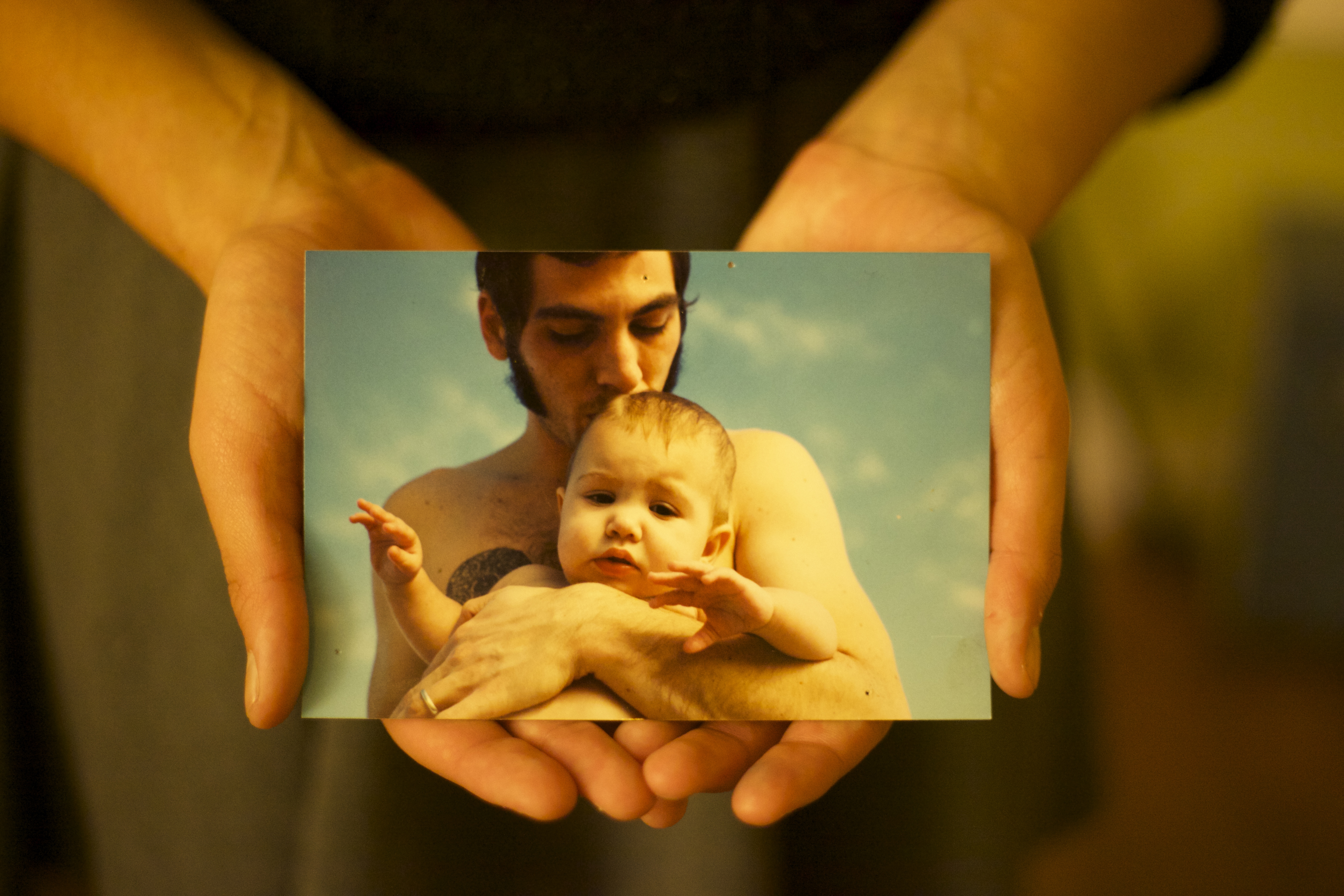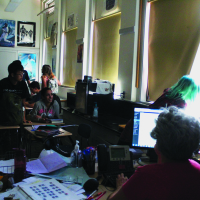On a crisp September night, Ella Timmons sat watching as the lanterns floated away, illuminating the dark sky. They moved higher and higher before disappearing from view.
As the Grant High School junior watched, she thought about 14-year-old Cruz Miller, a long-time family friend who died Memorial Day weekend in a tragic accident that she witnessed. The lanterns were released at the Sellwood Docks as part of a celebration of his life.
Timmons, 16, and her brother, Frank, 14, who is now a freshman at Grant, have grappled with death before. The lanterns floating into the sky on that September night were a reminder of how the siblings had lost their father, Heath Timmons, to suicide four years ago.
Once a year, her family releases lanterns to honor their dad, who took his own life at age 36 after battling depression.
“I do have those thoughts of ‘why is it fair that these things have happened to me so young?’” Ella Timmons says. “Most people don’t go through this kind of trauma until they are older, if even.”
Experts say loss and the grief that follows can be tough on any family. But for teens trying to make sense of the world around them, sometimes such experiences can have devastating effects. Counselors say getting help for teens can be tricky, because adolescents aren’t usually likely to open up to adults. But understanding loss – and how to cope with it – is important, they say.
“Grief is not a six-week program,” says Donna Schuurman, the chief executive officer of the Dougy Center, a Southeast Portland agency that helps families and young people deal with death. “You don’t do therapy for a couple months and automatically feel better.”
Before their dad died, the Timmons siblings had to face the struggles of having divorced parents. Over the course of their childhood, they lived in a total of nine houses.
“I thought it was normal to be moving so much and I thought the kids who were living in just the one house were weird,” Ella Timmons says. There were two different sets of rules, two different routines and two different lifestyles between the houses that the siblings had to get used to when their dad was still alive.
The constant moving forced them to rely on each other for stability. “They were very close when they were younger. They always had been,” says their mom, Mary Zuleger.
Growing up, Ella and Frank Timmons would hang out and play together.
When the siblings were young, Heath Timmons loved to take them outdoors. Ella Timmons’ most fond memory with her father was a trip she took with him and Frank to Trillium Lake. “It was such a good day, one that I will never forget,” she says.
The siblings also remember the day their father died.
Ella Timmons remembers walking through their front door with Frank to find family friends gathered in the living room. They were led to the couch where loved ones continued to embrace them and rub their backs. Timmons looked up to see her mom walk out of the bathroom, teary eyed and flushed, sharing the news that their father had committed suicide.
“When we found out, it felt like a nightmare. It didn’t feel real at all,” says Frank.
The suicide left them in a state of disbelief and denial. They had no idea what their dad had been going through, learning only later that he had struggles with depression. “My mom would often tell Frank and I to give him a hug when we saw him but never really thought much of it,” Timmons recalls.
Timmons didn’t know how to deal with her feelings about death after her father died. It felt like no one knew what she was going through, she remembers. “I felt as though other people didn’t know how to talk to me about it and I felt like the odd one out.”
After a while, people stopped bringing food by and checking in on the family. She realized that having people over was distracting her but when they were gone it was quiet. It left her with an almost empty feeling and she thought about it more. She realized she hadn’t dealt with grief so close to home before.
Zuleger worried that her children would become closed off. The siblings didn’t want to go to therapy and rejected the idea. That was when Zuleger found the Dougy Center. “The Dougy Center was the light for us,” she says.
She wanted a place where they could go that was a different experience for each of them. She liked that they could go but weren’t forced to talk. Instead, they could just listen to other’s experiences. She came to realize the support groups at the center made them feel safe and not isolated.
“It wasn’t a therapy thing where people are telling you how you should feel,” says Zuleger.
Timmons says she found comfort in being around people who knew what she was going through. She felt better after each visit, realizing that she could only gain closure if she accepted what happened and let time pass.
Schuurman often sees teens like the Timmons siblings visit her agency. In some cases, the people who walk through the doors of the center have lost close relatives, friends or other people important to them.
Death isn’t something that’s always talked about openly in American society. And with teens, those kinds of conversations with adults can be hard to come by.
Keeping it inside can hurt in the long term, Schuurman says. Programs at the center are designed to help those coping move toward closure.
Frank Timmons’ time at the center helped him realize that his experience with death wasn’t going to ruin his life. “They are still normal people after what they’ve been through,” says Frank. “It doesn’t make you different.”
Schuurman says talking about what you are going through helps people begin to cope with the loss. “Experiencing a death with someone close to you can trigger all kinds of risk factors,” says Schuurman. The talking can help prevent those risk factors such as depression and anxiety.
Four years after losing their dad, the Timmons kids faced another crippling loss.
Every year, the Japanese Magnet Program the Timmons’ are a part of heads to Camp Westwind on the Oregon Coast for a weekend. The kids in the program grow up together, starting at Richmond Elementary School, continuing through Mt. Tabor Middle School and then into Grant through the language program.
Ella Timmons remembers how fun-filled the trips were in the past. “Leading up to it, I would always see people in the halls who were going and we would get pumped by talking about it.”
Zuleger took the extra step and invited Miller, who was Frank’s best friend and classmate, to join them.
The outing was a success and everyone enjoyed spending time together. On the last day, Ella Timmons remembers standing on the beach with a group of friends and their parents, watching the waves of the Pacific Ocean roll in.
Timmons, who was nearing the end of her sophomore year at Grant, waited with the others for a tractor with a trailer attached to drive some of them to a barge ride across the river. It’s how the camp typically ends each year, the kids who don’t want to walk the last stretch of the beach run alongside the trailer and try to jump on.
She remembers watching as Miller chased after the already moving rig. When he jumped and grabbed onto the side, he struggled to pull himself up. He lost his grip and fell beneath one of the back wheels of the trailer.
People began to help immediately and many parents stepped up to help Miller until an ambulance arrived. Timmons doesn’t recall what she was thinking at the time because so many emotions were running through her mind, but she tried to stay calm. Once the ambulance drove away, everyone slowly began to leave, trying to process what had just happened.
Ella Timmons remembers trying to stay positive on the car ride home. “You’re always going to try and think the best in any situation,” says Timmons.
They found out later Miller had died from his injuries.
Timmons worried most about Frank. “Losing his dad has taken a big toll on him and to lose two such close people in his life I definitely worry,” she said.
After Miller’s death, the Timmons siblings had to rely on what they learned at the Dougy Center from dealing with their father’s death. Both reflect now how they’ve gained understanding about what it means to lose someone and that, through the Dougy Center, being able to talk about what happened is the best therapy. Their father and Cruz will always be a part of their lives.
“It’s never really over,” Frank Timmons says.
As each family member reflects today, losing Miller so recently is still raw for them. There are still so many “what ifs,” they say.
The Timmons family is reminded of lost loved ones by anything from skateboarding, Miller’s favorite pastime, to hearing classic rock, their father’s favorite genre.
Frank Timmons has found a love for music, sifting through and playing his old vinyl records. Ella Timmons is on the Grant Gendrills dance team and is one of the head captains this year. She loves to dance and has taken to the leadership role.
The siblings rely on each other even more now after the losses they’ve faced. And those losses have made them stronger. “I have learned to deal with other people’s emotions and that my experiences have made me more mature and understanding as a person,” Ella Timmons says. “I don’t want what has happened to define me.”




